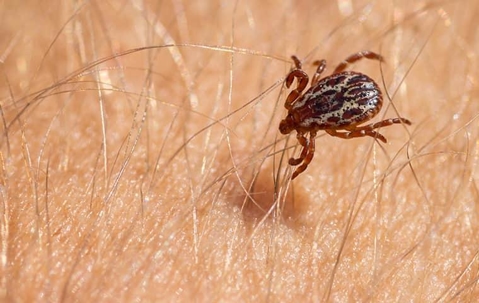Working with a New Jersey pest control company experienced in tick removal and control will yield the most positive outcome when dealing with ticks on your property.
Common Types Of Ticks Found In New Jersey
New Jersey is home to several of the most common kinds of ticks:
- The black-legged or deer tick is an arachnid that feeds on blood from birds, reptiles, and mammals, including humans. It is the most common carrier of Lyme disease in New Jersey.
- The American dog tick feeds on the blood of mammals, primarily dogs, cats, and humans. It is a major vector for Rocky Mountain spotted fever (RMSF), which can be fatal if not treated promptly.
- The lone star tick is not as common in New Jersey but is still common in areas where previously introduced. It can transmit several diseases, including tularemia and canine ehrlichiosis.
- The brown dog tick is typical in homes and kennels. It can also transmit diseases, including Rocky Mountain spotted fever (RMSF) and canine ehrlichiosis.
Although the incidence of tick-borne diseases in New Jersey is relatively low, it's still important to be vigilant when outdoors by taking steps to prevent tick bites.
Tick Bites Can Be Very Dangerous
Tick bites can be very dangerous as they can transmit a variety of diseases to humans. These diseases include Lyme disease, Rocky Mountain spotted fever, ehrlichiosis, tularemia, and the Powassan virus. Symptoms of tick-borne illnesses depend on the type of infection but may generally include fever, headaches, joint pain, chills, and fatigue. Any tick bite should be monitored for signs of infection for up to 30 days after a bite occurs. If any symptoms of infection arise, you should seek medical attention immediately.
Effective Tips To Protect Yourself From Tick Bites
There are a variety of different types of ticks in New Jersey, and we need to protect ourselves from these parasitic pests with the following tips when spending time outdoors:
- Wear light-colored clothing that helps you easily spot ticks attached to your clothes.
- Use products containing permethrins that you can use to treat clothing and gear.
- Avoid tall grass and wooded areas where ticks can hide.
With preparation and diligence, you can avoid contact with these unwanted pests.
The Most Effective Tick Control For Your Yard
Heritage Pest Control provides effective tick removal for your yard that is safe for you and your family. Our well-trained staff will inspect your property to identify problem areas and provide customized treatments to eliminate tick populations near your New Jersey home. We founded our family-owned and operated business in 1989 and always provide minimally invasive methods to eliminate harmful pests from your home.
Heritage Pest Control also provides preventive measures for your property, which can help keep ticks away. We use products that contain natural, plant-based ingredients such as peppermint oil and garlic to get rid of ticks. These methods are safe and effective and can reduce the tick population in your yard. Contact us today, to learn more about our residential and commercial pest control services in New Jersey. We'll eliminate any annoying ticks you and your family.

